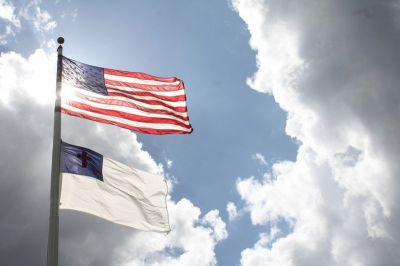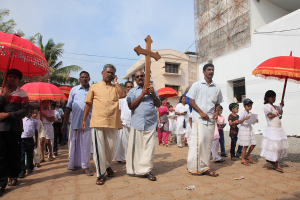Understanding key differences: Christian conservatism vs. Christian nationalism

Most of what is written about Christian Nationalism is silly. Critics and analysts sweepingly deride conventional Christian conservatives as Christian Nationalists. By some counts, there are, by this definition, tens of millions of Christian Nationalists. Sometimes even civil religion, with its homage to a vague deity, is labeled Christian Nationalism. If so, all presidents from George Washington to Joe Biden are Christian nationalists. Sometimes the target is folk religionists who conflate God and country.
They sometimes sport paraphernalia with American flags draped around the cross. These folk religionists typically aren’t aware they are Christian nationalists. They don’t publish articles, much less books. And they typically don’t have policy agendas, just an attitude that God and country should be interchangeably honored.
But some more intellectual Americans do consciously self-identify as Christian Nationalists. Politico has published an article about two of them. But unhelpfully the article does not explain distinctions and, like a hundred other articles, focuses on a combination of Christian conservative and New Right views held by their subjects without defining why they call themselves Christian Nationalists.
Christian Nationalism is distinct from conventional Christian conservatism. The former are typically post-liberals who want some level of explicit state-established Christianity. The latter have been and largely still are classical liberals who affirm traditional American concepts of full religious liberty for all. Both groups want a “Christian America.” But the former want it by statute. The latter see it as mainly a demographic, historical, and cultural reality.
The most sophisticated contemporary articulation of Christian Nationalism is Stephen Wolfe’s book A Case for Christian Nationalism. Wolfe draws upon early magisterial Protestant thinking in favor of a Protestant confessional state that suppresses the outward display of “false” religion while not trying to govern human hearts. Wolfe extols “a measured theocratic Caesarism” and prays for “a Christian prince, a great renewal.” He explicitly writes as a Calvinist for a Calvinist audience. Nearly all self-identified Christian Nationalists are Calvinists, typically Presbyterian like Wolfe, but often theologically Reformed Baptists like the subjects of the Politico article. The latter can be confusing because traditional Baptists are most associated with religious liberty.
Self-identified Christian Nationalists favorably reviewed Wolfe’s book. So too did National Conservatism, which liked its theme of social unity through religion. National Conservatism’s 2022 Statement of Principles, which I critiqued here, vaguely echoed Christian nationalist themes by declaring Christianity “should be honored by the state and other institutions both public and private,” with Jews and “other religious minorities … protected in the observance of their own traditions, in the free governance of their communal institutions,” and with all adults “protected from religious or ideological coercion in their private lives and in their homes,” but not evidently in their public lives. Public neutrality about religion, with a state granting equal rights to all regardless of faith, is deemed by this statement, and certainly by Christian nationalism, as subversive to morality and social cohesion.
Christian nationalists are almost always some form of Protestant integralists. Catholic integralists want a society where the Catholic Church is paramount in society including in civil law. Both Protestant and Catholic integralists believe the state cannot be neutral. Either it will establish the “true” faith, or it will establish a false one, which is currently, as they define it, aggressive secularism. They both believe that a truly Christian society will have a government pointing to the highest good, and that magistrates are God’s shepherds for directing the people towards the truth. Coercion in religion is necessary to protect society and individual souls.
Coercion and religious freedom are where Christian Nationalism is most distinct from traditional Christian conservatism. The modern Religious Right was founded in the 1980s by Baptists like Jerry Falwell and Pat Robertson who, in the tradition of their faith, saw religious freedom for all as sacrosanct. They were, as are most Christian conservatives, American exceptionalists and enthusiasts for the country’s founding charters and for democracy. Both were, coincidentally, Virginians who appreciated the Virginia Statute of Religious Freedom, crafted by Thomas Jefferson and James Madison. They were, like most Christian conservatives, descendants of the Second Great Awakening that followed the American Revolution, which was voluntarist, democratic, hostile to state churches, and launched a tradition of moral and social reform through political action.
Christian nationalists are typically skeptical if not hostile to the Second Great Awakening’s legacy. They prefer the First Great Awakening, led by Calvinists like Jonathan Edwards and George Whitefield, and mostly still tied to established churches. But even more so, hardcore Christian nationalists revere earlier Christian commonwealths such as the 17th-century Puritans, or Scotland under John Knox, or Geneva under Calvin, whose models they deem instructive if not binding. More moderate Christian nationalists will try to argue the U.S. Constitution, even while disavowing religious establishment and religious tests for public office by the federal government, did not preclude established religion for local government.
Christian nationalists are less American exceptionalists than traditional Christian conservatives. And in this regard, they differ from the folk religionists who conflate God and country. Stephen Wolfe, in his book, is not interested in American patriotism or very much in America in general. As a postliberal, he can’t cheerlead for American founding principles. He wants a premodern Christian society. Christian nationalists typically differ strongly from Christian conservatives about America’s role in the world. The former are more isolationist and more concerned about restricting immigration. Christian conservatives, especially the modern Religious Right, have advocated for an aggressive U.S. foreign and defense policy. They championed U.S. victory in the Cold War. And they supported the Iraq War, which Christian nationalists deride as proof of traditional Christian conservative bankruptcy. There is a similar divide currently over support for Ukraine. And, beneath the surface, Christian nationalists are less enthusiastic about Israel than are Christian conservatives. The latter, besides being internationalists, are also Zionists. Theology for most Christian nationalists precludes a vigorous Zionism.
Christian conservatives have favored limited government and free markets, of which Christian nationalists are suspicious, preferring protections and a regulatory state in the right hands. Christian conservatives want the U.S. to advocate for religious freedom internationally, about which Christian nationalists are suspicious or at least less interested. Christian nationalists want protections for Christianity mainly in the U.S., much less so overseas, and are not much interested, if not opposed, in advocacy on behalf of freedoms for other religions.
Christian nationalists, as seen in Wolfe’s dream of a theocratic prince, are more open to the strong man view of history. Typically, Christian conservatives are more suspicious of politically strong men, which they would deem cultic. Christian nationalists, nearly always staunch Calvinists, have a strong view of social hierarchy. Some quietly oppose voting rights for women. They have more trust in the “elect.” Christian conservatives, who usually have been Baptists or generic evangelicals, are usually more democratic and unstructured.
Across 40 years, Christian conservatives were routinely accused of being theocratic. But their leaders, beyond wanting traditional morality and public rhetoric about God, almost never wanted religious establishment. They disavowed the Christian Reconstructionists who wanted “biblical law.” Christian Nationalists don’t want biblical law in terms of Old Testament punishments. But they do want the establishment explicitly favoring Christianity against other religions.
Christian conservatism has mostly been a populist movement mobilized by parachurch groups and leaders. Christian nationalism is more intellectual and has far fewer adherents. But its intellectual prowess enables it to insinuate itself into postliberal wider circles. Christian nationalists sometimes disparage Traditional Christian conservatism as failed and archaic. Christian nationalism is newer, shinier, more provocative, and brasher. It proudly strives actually to become what critics falsely claimed about Christian conservatism.
In 1981 the Institute on Religion and Democracy’s founders agreed on a statement “Christianity and Democracy,” drafted by prominent Christian conservative intellectual Richard Neuhaus, backed by fellow Christian conservatives Michael Novak, who was Catholic, and Carl Henry, who was Baptist. Its vigorous affirmation of democracy, human rights and religious freedom would preclude endorsement by today’s Christian nationalists. But most Christian conservatives could still support.
These distinctions between Christian conservatives and Christian nationalists are important. Those preferring caricatures and strawmen with conflate the two. But careful analysis will explain the differences.
Originally published at Juicy Ecumenism.
Mark Tooley became president of the Institute on Religion and Democracy (IRD) in 2009. He joined IRD in 1994 to found its United Methodist committee (UMAction). He is also editor of IRD’s foreign policy and national security journal, Providence.



























